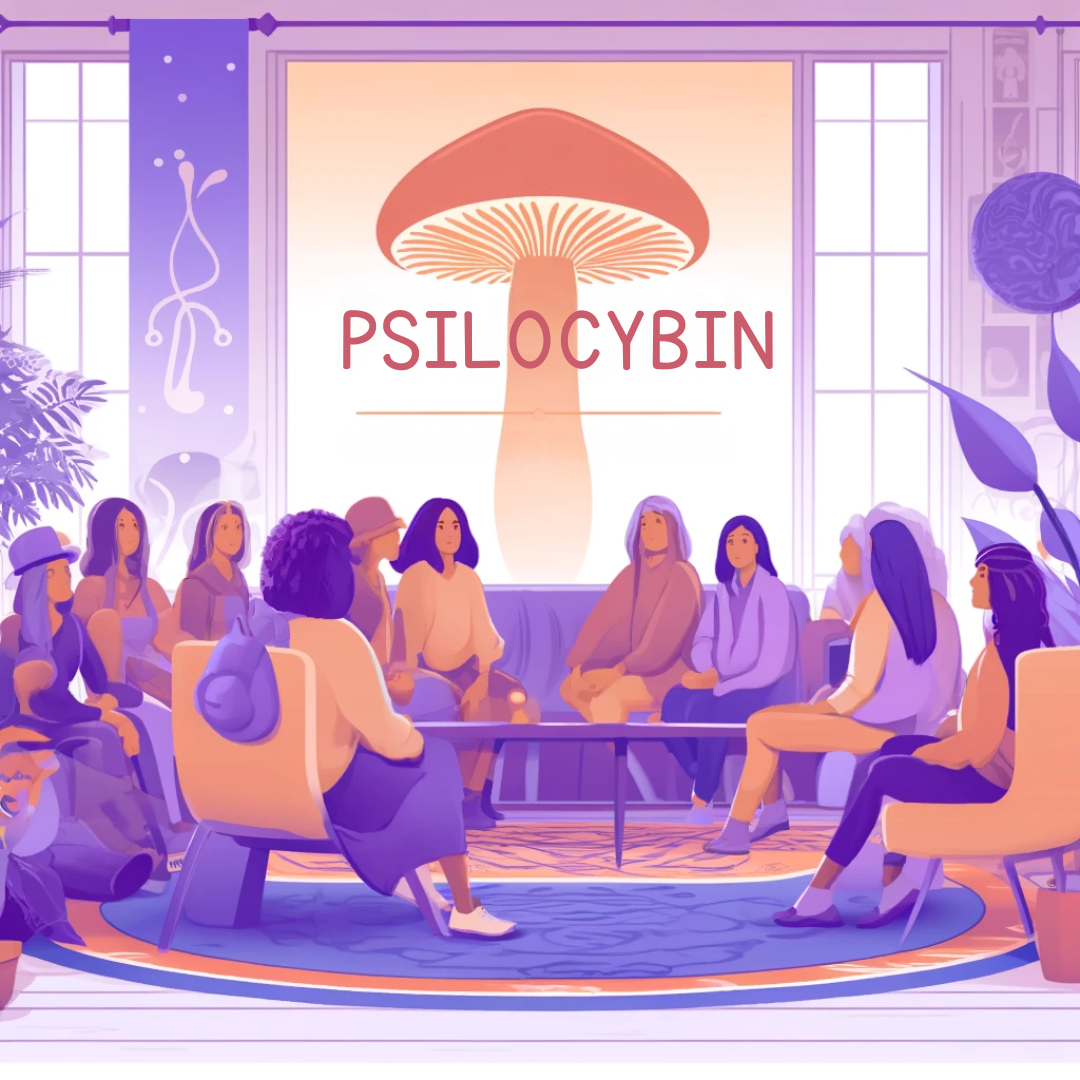Therapeutic and Traditional Uses of Psilocybin for Women: Current and Future Perspectives
Written by Melissa Barall, CFA, Content Writer, FemHealth Insights
Psilocybin, the psychoactive compound found in certain mushrooms known as "magic mushrooms," has a rich history of use in traditional and ancestral medicine, particularly in indigenous cultures across the globe. In recent years, psilocybin has gained significant attention for its potential therapeutic applications, especially in addressing mental health challenges such as depression, anxiety, and PTSD. Around 50% of women in the U.S. have needed mental health services in the past two years, making this more than a $40 billion market that could be disrupted by plant medicine.
Traditional and Ancestral Uses of Psilocybin
Psilocybin has been used for centuries by indigenous communities in various regions, such as Central and South America, for spiritual and healing purposes. Traditional ceremonies involving psilocybin mushrooms often center around rites of passage, religious experiences, and healing rituals. These practices are deeply rooted in a holistic understanding of the interconnectedness of mind, body, and spirit, and they can foster a sense of community and collective well-being.
For women, traditional uses of psilocybin may have involved ceremonies to address issues such as fertility, menstruation, childbirth, and menopause. These experiences offered a space for women to explore their inner worlds, gain insight, and connect with their ancestral heritage.
Therapeutic Uses of Psilocybin
In contemporary clinical settings, psilocybin has emerged as a promising treatment for mental health conditions, particularly for women who may face unique challenges in their experiences. Recent studies have demonstrated psilocybin’s effectiveness in treating depression, anxiety, and PTSD, offering a new avenue for managing these conditions beyond traditional pharmaceuticals. One survey by Compass Pathways focused on women with anorexia nervosa and found that 40% of women had reduced psychopathology at a three-month follow-up.
Women may benefit from psilocybin therapy due to its potential to enhance emotional processing, introspection, and self-awareness. For example, research has shown that psilocybin-assisted therapy can alleviate anxiety and depression in cancer patients, offering hope and comfort during difficult times.
In one study conducted in Canada, the majority of women interested in psilocybin generally suffered from chronic conditions, depression, PTSD, sexual trauma, and others. A majority of “marginalized” women in that study were interested in potential therapies, which may show potential for exploration in socioeconomic disparities.
Psilocybin Policy Landscape Overview
United States:
In the United States, psilocybin is currently classified as a Schedule I substance under the Controlled Substances Act, which means it is considered to have a high potential for abuse and no accepted medical use. However, recent years have seen significant shifts in local and state policies regarding psilocybin.
For example, Oregon became the first state in 2020 to legalize the therapeutic use of psilocybin under the supervision of licensed professionals. The state is developing a regulatory framework for psilocybin therapy, including safety standards and training requirements for facilitators.
Other cities, such as Denver, Colorado, and Oakland, California, have also decriminalized the use and possession of psilocybin-containing mushrooms, making them a lower priority for law enforcement. These policy changes reflect growing public support for the therapeutic potential of psilocybin and a shift toward a more progressive approach to drug policy.
Globally:
Policies on psilocybin vary significantly around the world. In some countries, such as the Netherlands, the sale and consumption of psilocybin truffles are legal and regulated. In other countries, such as Canada, there is growing interest in psilocybin research, particularly for its potential therapeutic applications. In 2020, Health Canada allowed four terminally ill patients to use psilocybin-assisted therapy under a special exemption program. For one of the female patients in this study, the psilocybin intervention was described as the “single-most personally meaningful experience of her life. This experience led to immediate, substantial, and sustained improvements in her distress and quality of life.” Findings like these, if disseminated globally, could lead to a completely different outlook on psychedelics as modern medicine.
In the United Kingdom and Australia, psilocybin is currently illegal but is under intense investigation for its potential therapeutic uses. Decriminalization and legalization could pave the way for these therapies to be used in healing women’s health conditions at significant levels.
Companies Innovating in Psilocybin
As interest in psilocybin therapy grows, several companies are driving innovation in the space:
Compass Pathways: This company is at the forefront of psilocybin research and development, focusing on creating safe and effective therapies for depression and other mental health conditions. They were the first company to conduct a study using psilocybin for the treatment of anorexia nervosa, which disproportionately affects women. The study indicated positive efficacy and safety of the treatment and expressed areas for further research.
MindMed: MindMed is conducting clinical trials to explore the potential of psilocybin and other psychedelics for treating anxiety and other psychiatric disorders. They have recently completed trials in several conditions that disproportionately affect women, including anxiety.
Usona Institute: This nonprofit organization is dedicated to advancing the understanding of psilocybin and its therapeutic potential through research and clinical trials. Some of their published research is devoted to emerging concepts such as the microbiome, which could have differential effects for men and women.
There are no active companies specifically devoted to women and psilocybin, but we hope to see more in the near future. There are some in the discovery phase that are not yet disclosed to the public.
Three Women Advancing the Field
Some takeaways from women in the industry:
Jennifer Chesak - Jennifer is a freelance journalist who has found herself at the cross-section of women’s health and psychedelics. She recently published The Psilocybin Handbook for Women, which has specific protocols and explanations of how psilocybin can benefit women.
In her book, Jennifer uncovers the phases of hormone fluctuations within the menstrual cycle, and she suggests that this is because estrogen affects binding at the serotonin receptor sites. Interestingly, it may affect menstrual cycle timing and can make a period come early depending on when the medicine is administered. She also mentions that psilocybin can help regulate menstruation. She pulls in indigenous wisdom, recommending that a medicinal psilocybin journey may be best suited around ovulation.
Melissa Dawn - Melissa is a psychoactive scientist and consultant with a recent emphasis on psilocybin and iboga. She is the founder of Dawn Scientific, a company focused on advancing the case for psychedelics and cannabis in modern healthcare conversations.
Melissa focuses on several areas of psychedelic science, from research and development to facility design to protocols. She then integrates this with licensing, regulation, and trial defense for end-to-end coverage. She showcases the full-spectrum approach needed in this emerging field and the care needed to merge science with policy protocols.
Milica Radovic Mandic - Milica is a passionate advocate for the transformative potential of psychedelics. She founded Bizdelics, an organization that provides resources and a psychedelic ecosystem guide, and Psilocybin San Francisco, which focuses on psilocybin use and harm reduction education. She also has her MSc in Psychology focusing on psilocybin and hosts a podcast called Psychedelic Pillow Talk.
Milica highlights that women may be more sensitive to psilocin, the active metabolite of psilocybin. She mentions that this needs to be considered when dosing, as females were observed to have greater effects at all doses in both humans and rats.
Potential Future Uses and Research Directions
The future of psilocybin use for women's health holds immense promise. Future research could focus on exploring psilocybin’s effects on conditions such as postpartum depression, premenstrual dysphoric disorder, and other reproductive health issues.
Additionally, there is a growing interest in psilocybin's potential to enhance creativity, personal growth, and well-being in women. By studying these effects, researchers can better understand how psilocybin may benefit women's mental and emotional health.
As research into psilocybin’s therapeutic applications for women progresses, we can expect to see a broader acceptance of this compound as a potential treatment for various health challenges. By honoring its traditional uses and exploring its modern therapeutic potential, we can pave the way for a new era of holistic and effective healthcare for women.
We expect to see a focus on these compounds in mental health, menopause and hormonal health, and sexual wellness, potentially integrating them into consumer packaged goods (CPG). Several projects in the ideation stage could garner interest in the space.
For more information on psilocybin research and resources, check outMultidisciplinary Association for Psychedelic Studies (MAPS) andPsychedelic Science Funders Collaborative (PSFC).For the author’s passion project on female health and psychedelic medicine, please see Femdelics.
About the Author:
Melissa Barall, CFA, is a dedicated finance and health professional, with experience in the private and public markets. She began her career on Wall Street in 2018 and has been a health and wellness advocate, angel investor, and superconnector along the way. Her mission is to bridge the gap for women in both investing and health care, and is passionate about mental health, wellness / biohacking, and psychedelics.


